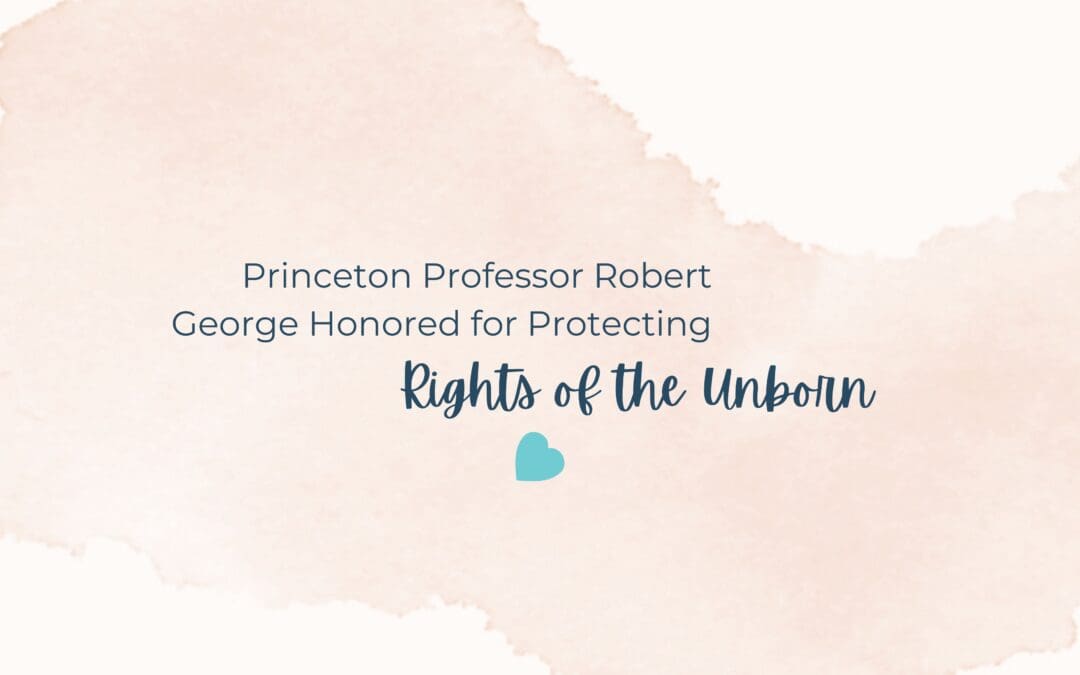Professor and legal scholar Dr. Robert P. George””the co-author of an amicus brief in the historic Dobbs Supreme Court case””recently received the University of Notre Dame’s 2023 Evangelium Vitae Medal, one of the nation’s most prestigious pro-life honors.
George, the McCormick Professor of Jurisprudence and Director of the James Madison Program in American Ideals and Institutions at Princeton University received his medal at a ceremony hosted by the Notre Dame’s de Nicola Center for Ethics and Culture on April 29, 2023.
Professor Robert George Honored
“In his lifetime of work, study, writing, and teaching, Professor George has insisted, valiantly and joyfully””over and again””on the essential dignity of the human person, the role of the law in defending it, and the possibility of our reasoning together in charity to promote it,” said O. Carter Snead, director of the de Nicola Center in a university news release. “Professor George’s patient, persistent demonstration of the right relationship between the civil and moral law has helped to lay the groundwork for a renewed appreciation of the rights of the unborn and an understanding of the proper role of law in defending those rights, following decades of profound injustice.”
In 2021, George and John Finnis, Professor Emeritus of Law at Notre Dame, co-authored an amicus brief in the Dobbs v. Jackson Women’s Health Organization Supreme Court case. They argued that the Mississippi law prohibiting elective abortion after 15 weeks of gestation was constitutional and Roe v. Wade and Planned Parenthood v. Casey should be overturned.
At the Evangelium Vitae Medal ceremony and celebration, George rejoiced in the fact that justice for the unborn had finally been granted in the United States.
“For forty-nine years, five months, and two days, our law taught a gross moral untruth,” said George. “It taught generations of our people that the choice to destroy a child in utero is a basic liberty, indeed a fundamental right; it taught that the child himself or herself is as nothing””a blob of tissue, a meaningless mass, a mere object, a piece of property rather than a person with dignity and a right to life. That is a false lesson. It is our job to help people to unlearn.”
In his role as a professor at Princeton University, George is known for his Socratic style and ability to engage in civil dialogue with those who possess different viewpoints.
“He has faith in the capacity for people who are open-mindedly seeking the truth to come to that through reasons and argument and evidence,” said Melissa Moschella, Associate Professor of Philosophy at Catholic University.
Moschella’s comments were featured in a video produced in conjunction with the medal ceremony. Notre Dame Law School Associate Professor Sherif Girgis, a former student of George’s at Princeton, was also interviewed.
“As a teacher, Professor George set the highest standards for intellectual rigor, moral courage, and devotion to truth and the common good while modeling a cheerful generosity toward every one of his intellectual opponents that often blossomed into genuine friendships,” Girgis said.
“You get on Princeton’s campus and you realize one of the most well-respected people, who is widely regarded as being deadly brilliant, is deeply pro-life.”
George, a former chairman of the United States Commission on International Religious Freedom, has authored, co-authored, or edited more than 13 books, including Embryo: A Defense of Human Life (2nd edition, Doubleday, 2011).
“Christians have an especially intense obligation to be truth seekers because our Lord himself is the truth,” George said. “You really can’t be, in the end, a determined truth seeker if you’re not going to be a courageous truth speaker.”

